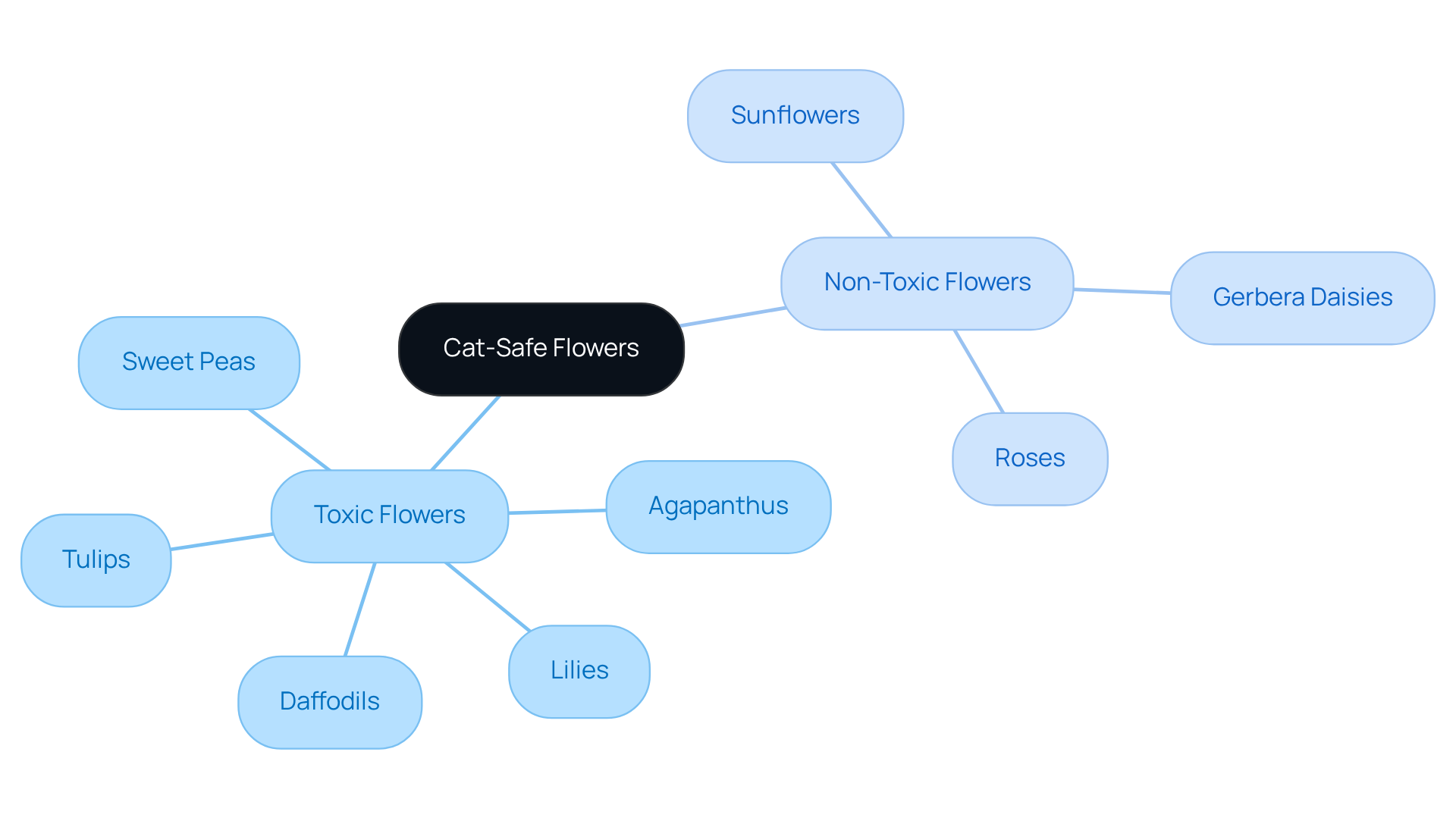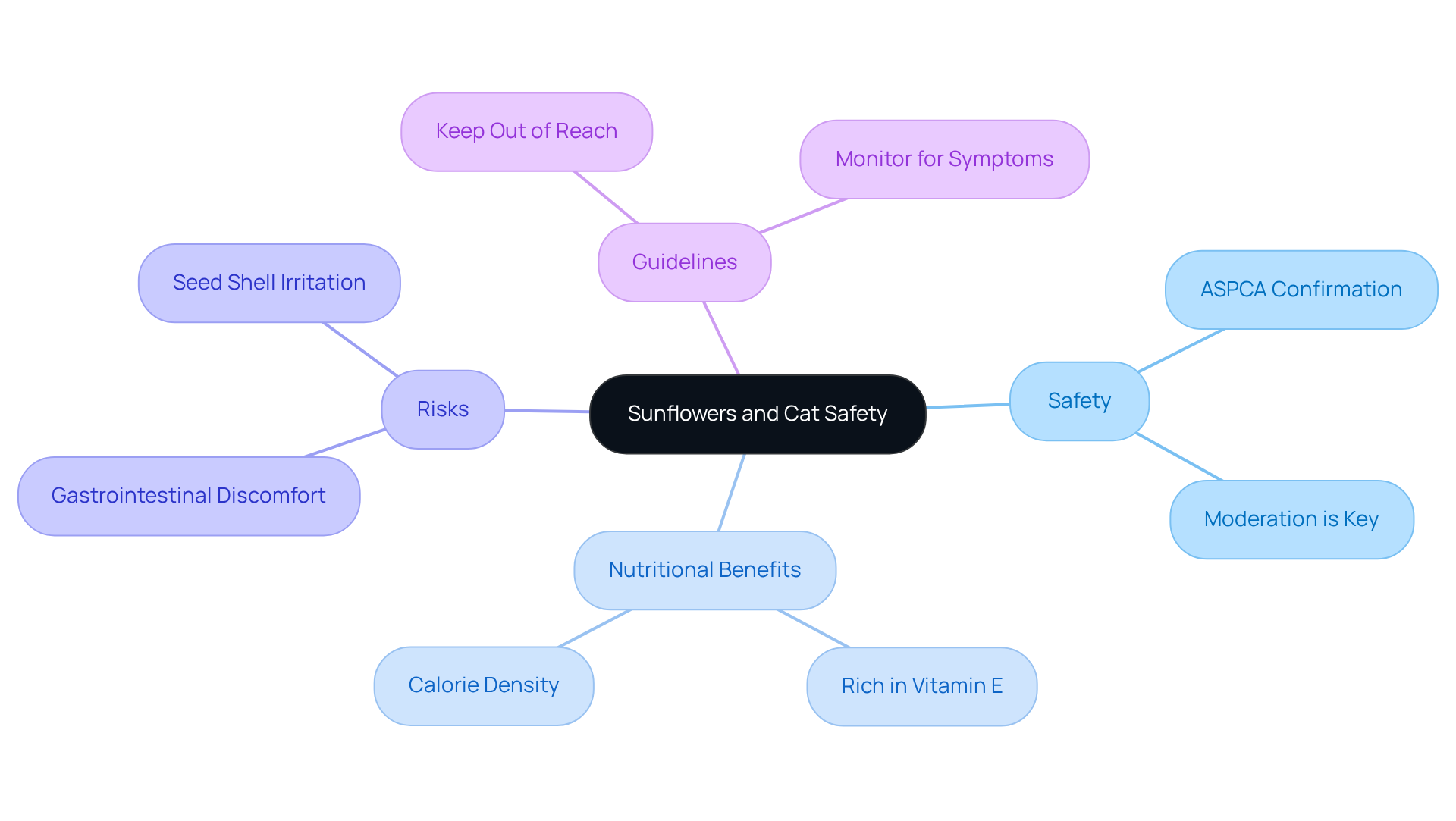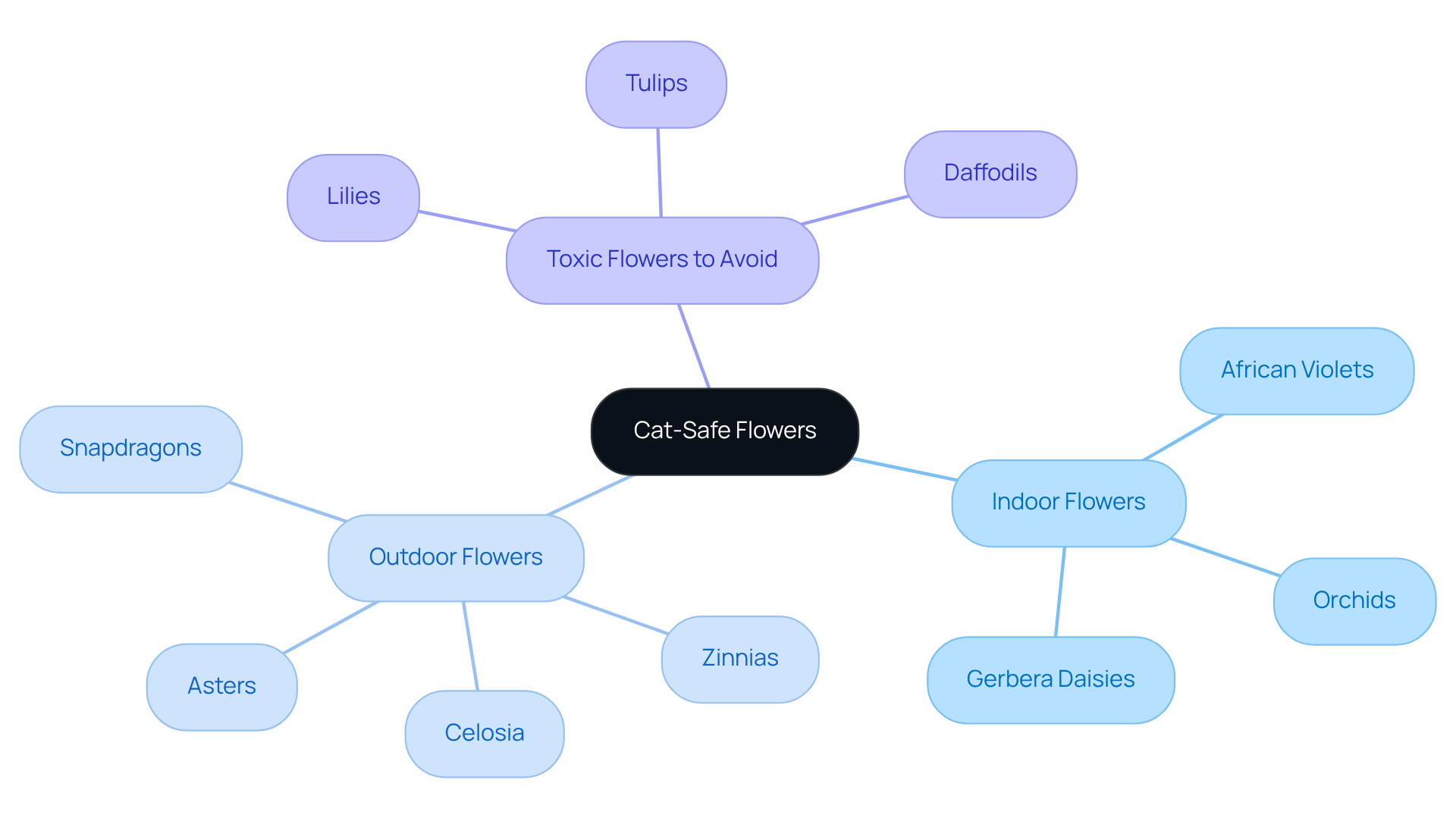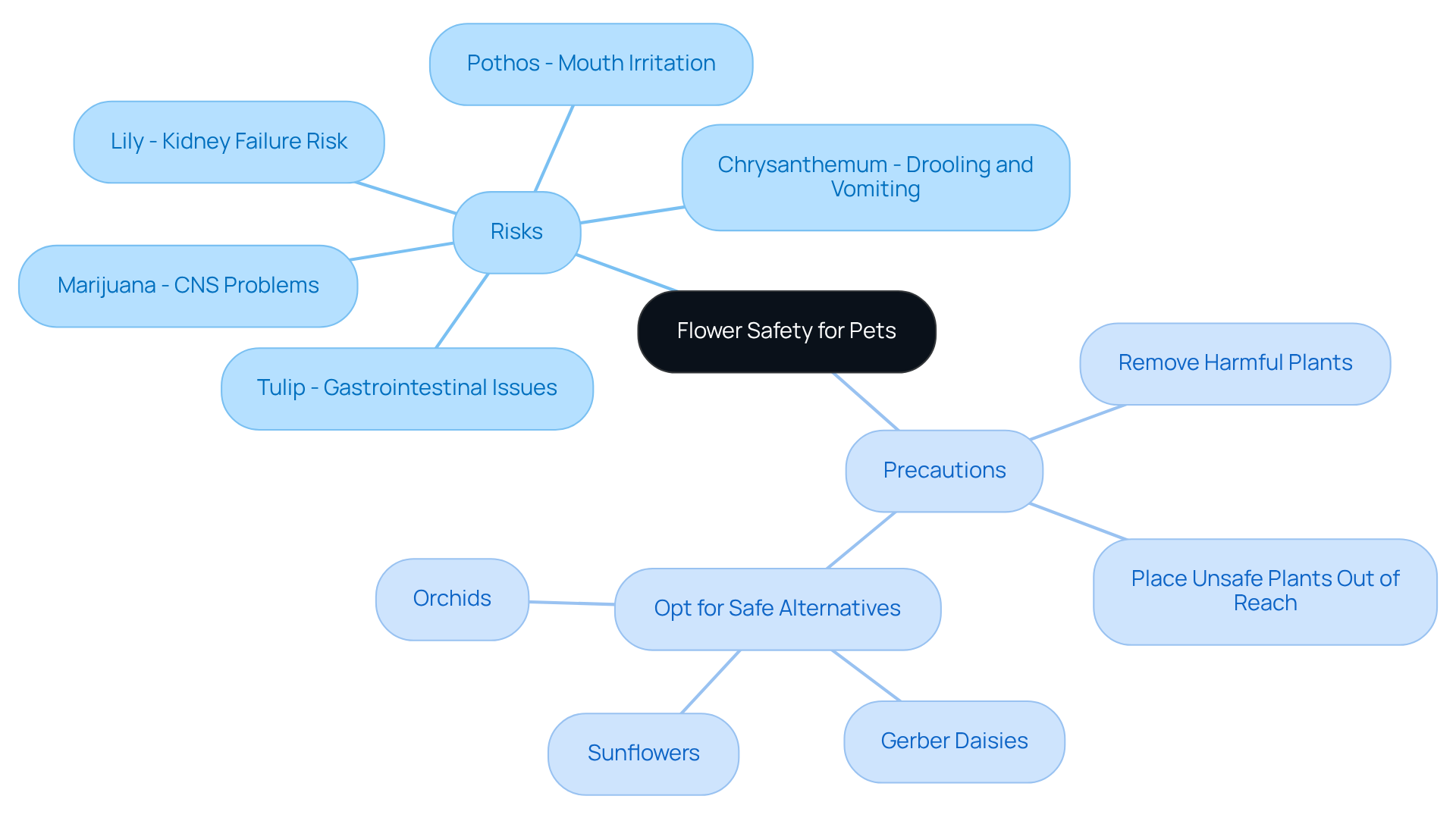
Are Sunflowers Toxic to Cats? Understanding the Risks
Overview
As a pet owner, your cat’s safety is undoubtedly a top concern, and it’s heartening to know that sunflowers are generally not toxic to our feline friends. According to the ASPCA, every part of the sunflower, including the seeds, is safe for your cat to consume. However, it’s important to approach this with a sense of moderation.
While sunflowers can be a delightful addition to your home, excessive intake may lead to mild gastrointestinal issues. This highlights the need to monitor your cat’s consumption closely, ensuring their health and well-being remain a priority. By taking these simple steps, you can enjoy the beauty of sunflowers while keeping your beloved pet safe and happy.
Introduction
The vibrant sunflower, often celebrated for its beauty and cheerfulness, raises an important question for pet owners: are these flowers safe for our beloved cats? With many common plants posing risks to feline health, it’s natural to feel concerned about the safety of our furry companions. Understanding the toxicity of sunflowers is crucial for creating a secure home environment.
While sunflowers are generally considered non-toxic, the lingering concerns about potential gastrointestinal issues from overconsumption can weigh heavily on our minds.
How can we, as caring pet guardians, enjoy the splendor of sunflowers while ensuring our cherished cats remain safe and healthy? It’s essential to find that balance, allowing us to appreciate nature’s beauty without compromising the well-being of our pets.
Defining Cat-Safe Flowers: Importance for Pet Owners
As a loving pet guardian, it’s crucial to ensure that the flowers in your home are safe, and to know if sunflowers are toxic to cats. Many common houseplants can indeed be harmful to cats, leading to questions such as, ‘are sunflowers toxic to cats?’, which can understandably cause concern. By choosing non-toxic flowers like sunflowers, gerbera daisies, and roses, you can create a beautiful and safe environment for your beloved pets, especially considering if sunflowers are toxic to cats. This not only enhances the aesthetic appeal of your home but also promotes the well-being of your furry friends.
It’s heart-wrenching to think about the potential health issues that could arise from toxic plants, including dangerous varieties like:
- lilies
- daffodils
- tulips
- sweet peas
- agapanthus
and the question of whether sunflowers are toxic to cats. To further protect your cats, it’s wise to keep cut flowers out of their reach, preventing any accidental nibbles. Focusing on these safe, non-toxic choices not only cultivates a lovely atmosphere but also enriches the joy and overall happiness of your pets, deepening the emotional bond you share.
By being proactive in selecting cat-friendly flowers, you are taking a significant step toward ensuring a nurturing space for your feline friends. Remember, your thoughtful choices can make a world of difference in their lives, allowing you both to enjoy a harmonious and vibrant home together.

Assessing the Toxicity of Sunflowers to Cats
Many people wonder, are sunflowers toxic to cats, as they are generally recognized as safe for our beloved feline companions? The ASPCA confirms that every part of the sunflower, including the seeds, is safe for cats to consume, leading to the inquiry, are sunflowers toxic to cats? However, it’s important to approach this with care; moderation is key, as excessive intake can lead to mild gastrointestinal discomfort, such as vomiting or diarrhea.
For example, while sunflower seeds are packed with nutrients and rich in vitamin E—beneficial for skin and coat health—they are also calorie-dense. A 30-gram serving contains about 175 calories, which accounts for nearly two-thirds of the daily caloric intake for a 10-pound cat.
Thus, while pet guardians can enjoy the cheerful presence of sunflowers in their homes, it’s essential to keep a watchful eye on their furry friends to ensure they don’t consume too much of any plant material, helping to maintain their health. Additionally, it’s wise to keep sunflower seed shells out of reach, as they may irritate a cat’s digestive system.
By being mindful of these considerations, cat caretakers can safely enjoy the beauty of sunflowers while ensuring their pets are happy and healthy.

Exploring Safe Flower Options for Cat-Friendly Homes
As a loving pet owner, you may find yourself concerned about the safety of your feline companions when it comes to choosing flowers for your home. It’s completely understandable; the thought of our beloved cats getting into something harmful can be distressing. Fortunately, there are many beautiful flowers that are safe for cats, allowing you to brighten your space without worry. Consider options like:
- Gerbera daisies
- Snapdragons
- Zinnias
- Asters
- Celosia
These not only add vibrant colors but also ensure the safety of your furry friends. For indoor environments, orchids and African violets are also excellent choices.
When selecting flowers, it’s essential to take a moment to research and confirm their safety, as some plants can be deceptively harmful. For instance, while sunflowers are generally safe, the concern is whether sunflowers are toxic to cats, as their seed shells can cause irritation if ingested. Keeping all flowers out of reach of curious cats is equally important to prevent any potential nibbling. By thoughtfully choosing cat-safe flowers, you can enjoy the beauty of nature in your home while prioritizing your pets’ health and well-being.
As Dr. Liza Cahn wisely advises, selecting pet-safe flowers allows you to appreciate their beauty while protecting your beloved companions from potential harm. Remember, your dedication to providing a safe environment for your pets is a reflection of your love and care, and with the right choices, you can create a harmonious space that both you and your cats will cherish.

The Importance of Educating Pet Owners on Flower Safety
Caring for our beloved pets means being aware of the safety of flowers, a crucial step in preventing accidental poisoning and ensuring the well-being of our feline friends. Many pet guardians may not fully grasp the risks associated with certain plants, which can lead to unintended harm. For instance, did you know that every part of the lily, even the water in its vase, poses a serious threat to cats? Ingesting any part of this flower can result in life-threatening kidney failure within just a few days. By providing clear information about which flowers are safe and which can be harmful, pet care experts empower caregivers to make informed choices for their furry companions.
Resources like the ASPCA’s lists of harmful and safe plants serve as vital tools for pet guardians striving to create a secure environment. Taking precautionary measures can make a significant difference; consider:
- Removing harmful plants from your home
- Placing those that are unsafe out of reach
- Opting for safer alternatives like sunflowers, but be sure to find out if sunflowers are toxic to cats, along with gerber daisies, which are generally safe for animals.
In 2021, the ASPCA reported assisting in over 401,550 pet poisoning incidents, underscoring the importance of educating pet caregivers about plant safety.
Ultimately, raising awareness about flower safety not only fosters a healthier environment for our pets but also brings peace of mind to their loving owners. Together, we can create a safe haven for our furry friends, ensuring they thrive in a nurturing setting.

Conclusion
Ensuring the safety and well-being of our beloved feline companions requires thoughtful consideration of the plants and flowers that grace our homes. Sunflowers, with their cheerful presence, are confirmed as non-toxic to cats, allowing pet owners to enjoy their vibrant beauty without worry. However, it’s important to remember that moderation is key; excessive consumption can lead to mild gastrointestinal issues. By understanding this balance, pet guardians can create a nurturing environment while appreciating the aesthetic charm of sunflowers.
Throughout this discussion, we emphasize the importance of choosing cat-safe flowers, such as gerbera daisies and zinnias, while remaining vigilant about potential risks associated with certain plants. It’s crucial to educate pet owners on flower safety, as many may unknowingly expose their furry friends to harmful varieties. Utilizing resources like the ASPCA’s lists of safe and toxic plants can empower us to make informed decisions that protect our cherished pets from accidental harm.
Ultimately, creating a cat-friendly home is about more than just aesthetics; it involves thoughtful precautions and caring choices. By selecting non-toxic flowers and being aware of potential risks, we can ensure a harmonious living space for both ourselves and our furry companions. This commitment to safety not only enhances the quality of life for our pets but also deepens the bond we share with them, fostering a loving and secure environment for all.
